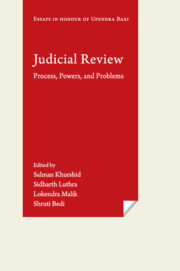Book contents
- Frontmatter
- Contents
- Foreword
- Editors' Note
- Introduction
- 1 The Inadequacy of Judicial Enforcement of Constitutional Rights Provisions to Rectify Economic Inequality, and the Inevitability of the Attempt
- 2 The Interplay of Law and Politics in India
- 3 Beating the Backlog: Reforms in Administration of Justice in India
- 4 Judicial Review: Perspectives and Reflections for the Twenty-First Century
- 5 When ‘Creeping Jurisdiction’ Goes Awry: The Social Action Litigation to Ban Surrogacy
- 6 Judicial Review and the Democratic Judge
- 7 Judicial Review: A Tool to Shape Constitutional Jurisprudence
- 8 The Baxian Bioscope on Indian Judicial Process
- 9 Judicial Activism, Courts, and Constitutional Revolutions: The Israeli Case
- 10 Democracy, Constitution, and Judicial Review: A Critique
- 11 A Minor Jurisprudence of Pathos: Upendra Baxi as Teacher and Writer
- 12 The Need for Reinventing the Supreme Court as a Constitutional Court
- 13 Appointment of ‘Distinguished Jurists’ as Judges in the Supreme Court of India: A Critical Analysis
- 14 Judicial Dissent and Judicial Review: A Functional Analysis
- 15 The Power of Judicial Review: Judicial Chutzpah or Judicial Desideratum
- 16 Judicial Review of Legislations by Tribunals in India: Law, Problems, and Perspectives
- 17 Criminalization of Membership of Terrorist Organizations in India and the United States of America: Human Rights Concerns
- 18 Article 142 of the Indian Constitution: On the Thin Line between Judicial Activism and Restraint
- 19 Sketching the Limits of Article 142 of the Constitution of India: A Constitutional Necessity
- 20 Constitutional Morality and Judges of the Supreme Court
- About the Contributors
- Index
8 - The Baxian Bioscope on Indian Judicial Process
Published online by Cambridge University Press: 23 January 2020
- Frontmatter
- Contents
- Foreword
- Editors' Note
- Introduction
- 1 The Inadequacy of Judicial Enforcement of Constitutional Rights Provisions to Rectify Economic Inequality, and the Inevitability of the Attempt
- 2 The Interplay of Law and Politics in India
- 3 Beating the Backlog: Reforms in Administration of Justice in India
- 4 Judicial Review: Perspectives and Reflections for the Twenty-First Century
- 5 When ‘Creeping Jurisdiction’ Goes Awry: The Social Action Litigation to Ban Surrogacy
- 6 Judicial Review and the Democratic Judge
- 7 Judicial Review: A Tool to Shape Constitutional Jurisprudence
- 8 The Baxian Bioscope on Indian Judicial Process
- 9 Judicial Activism, Courts, and Constitutional Revolutions: The Israeli Case
- 10 Democracy, Constitution, and Judicial Review: A Critique
- 11 A Minor Jurisprudence of Pathos: Upendra Baxi as Teacher and Writer
- 12 The Need for Reinventing the Supreme Court as a Constitutional Court
- 13 Appointment of ‘Distinguished Jurists’ as Judges in the Supreme Court of India: A Critical Analysis
- 14 Judicial Dissent and Judicial Review: A Functional Analysis
- 15 The Power of Judicial Review: Judicial Chutzpah or Judicial Desideratum
- 16 Judicial Review of Legislations by Tribunals in India: Law, Problems, and Perspectives
- 17 Criminalization of Membership of Terrorist Organizations in India and the United States of America: Human Rights Concerns
- 18 Article 142 of the Indian Constitution: On the Thin Line between Judicial Activism and Restraint
- 19 Sketching the Limits of Article 142 of the Constitution of India: A Constitutional Necessity
- 20 Constitutional Morality and Judges of the Supreme Court
- About the Contributors
- Index
Summary
Introduction
Judicial process has been routinely defined as the study of what judges do and what they ought to do. Several presumptions are built into this trite definition. It presumes that there is a standard template on the tasks that judges perform, which can be usefully employed as a checklist to determine what judges do. Similarly, it assumes that there is an evaluative touchstone that can be universally employed to determine what judges ought to do. The standard judicial process theories emanating from the Global North are primarily ensconced in the separation of powers doctrine, whereby judges are only required to fathom legislative intention and steer statutory interpretation and implementation accordingly. Any trenching into legislative spaces is not kosher. Later theories have not accorded with this essentialist formulation and judges have been asked to complement what the legislature has done and at times even reconstruct legislative scripts in order to give a look-in to the more excluded social groups. Despite several efforts to displace it, the essentialist model which frowns upon judicial choice and law-making continues to occupy dominant position in North legal writing and the process of colonial osmosis ensures that it exerts influence on Global South legal scholarship. It is here that Baxi strikes out. In his view, the legal theory that jurisprudents of the North have devised for their judges in politically stable societies, with universal representation rights, cannot be grafted onto South polities, which are still working out their social, political, and economic hierarchies. The role that judges need to play in such societies of flux cannot be borrowed from stable and settled polities. Since he finds the theories constructed in the North to be irrelevant for India, his oeuvre on judicial process is a lifetime exercise of constituting such theory.
Without aiming to be exhaustive, I would include in this opus the following kinds of writing:
• assessment of the relationship between the court and the executive at different points of its existence
• comments on specific judicial decisions
• evaluation of particular judges and their work
• analysis of specific institutional choices such as appointments, suspensions, dismissal, transfers, power of contempt, and other disciplinary options.
- Type
- Chapter
- Information
- Judicial Review , pp. 145 - 162Publisher: Cambridge University PressPrint publication year: 2020



